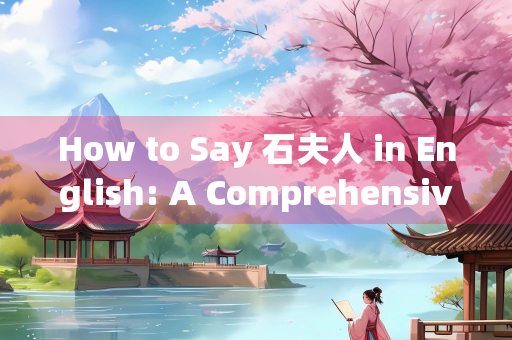Introduction

Language is a bridge that connects cu lt ures, and translating names or titles from One language to another can sometimes be a challenge. One such example is the Chinese term& quot ;石夫人" (Shí Fūrén), which carries historical and cultural significance. If you've ever wondered how to say"石夫人" in English, this article will explore the possible translations, cultural context, and the best ways to convey its meaning accurately.
Literal Translation: "Stone Lady" or "Lady Stone"
The most straightforward translation of"石夫人" is"Stone Lady" or"Lady Stone." Here’s why:
石 (Shí) means "stone" or "rock."
夫人 (Fūrén) is a respectful term meaning "lady," "madam," or "wife of a nobleman."
Thus,"Stone Lady" is a direct translation that retains the original meaning. However, translations are not always about word-for-word accuracy—cultural and historical context also play a role.
Historical and Cultural Context of "石夫人"
Before deciding on the best translation, it’s important to understand who or what"石夫人" refers to. The term appears in different contexts:
1. Mythological or Folkloric Figure
In some Chinese legends,"石夫人" is a mythical woman turned into stone, often symbolizing loyalty or tragedy. For example:
- InWenzhou, Zhejiang Province, there is a famous rock formation called"石夫人峰" (Shí Fūrén Fēng), resembling a woman gazing into the distance. Local folklore says she was a devoted wife waiting for her husband, who turned into stone.
- Similar legends exist in other regions, where"石夫人" represents enduring love or sorrow.
In this case,"The Stone Lady" (with capitalization) is appropriate, as it treats the name like a title (similar to"The Lady of the Lake" in Arthurian legends).
2. Historical or Noble Title
If"石夫人" refers to a historical noblewoman (e.g., the wife of a man surnamed石 (Shí)), the translation could be:
"Lady Shi" (using the surnameShi/Shih in English).
"Madam Shi" (a more formal address).
This follows the convention of translating Chinese noble titles, such as:
"武则天" (Wǔ Zétiān) →"Empress Wu"
"慈禧太后" (Cíxǐ Tàihòu) →"Empress Dowager Cixi"
3. Artistic or Literary Reference
In poetry or classical literature,"石夫人" might symbolize resilience or permanence. A translator might choose:
"The Stone Matron" (if emphasizing dignity).
"The Petrified Lady" (if focusing on the transformation myth).
Which Translation is Best?
The best translation depends on the context:
| Context | Recommended Translation | Example Usage |
| Mythological figure | The Stone Lady | "The Stone Lady is a famous rock formation in Wenzhou." |
| Historical noblewoman | Lady Shi / Madam Shi | "Lady Shi was a prominent figure in the Tang Dynasty." |
| Literary metaphor | The Petrified Lady | "The poem describes her as the Petrified Lady, forever waiting." |
Common Mistakes in Translation
When translating"石夫人," some errors can occur:
1、Over-literal translations: "Rock Wife" sounds unnatural in English.
2、Ignoring cultural weight: If "石夫人" is a legendary figure, simply calling her "Stone Woman" loses the poetic nuance.
3、Misidentifying the surname: If "石" is a family name, translating it as "Stone" instead of "Shi" could be incorrect.
Conclusion: How to Choose the Right Translation
To accurately translate"石夫人" into English, consider:
1、Is it a name, title, or legend?
2、Does it refer to a real person or a mythological symbol?
3、What is the tone—formal, poetic, or folkloric?
For most cases:
"The Stone Lady" works for myths and natural landmarks.
"Lady Shi" is best for historical figures.
"The Petrified Lady" suits poetic or tragic contexts.
Language is fluid, and translations evolve. The key is to preserve the original meaning while making it natural in English. Next time you encounter"石夫人," you’ll know exactly how to say it!
Word Count: 1027
Would you like additional examples or further clarification on any of these translations? Let me know how I can refine this guide for you!
本文地址: https://www.shuiwy.com/a/99438.html
文章来源:im
版权声明:除非特别标注,否则均为本站原创文章,转载时请以链接形式注明文章出处。
2026-02-07im
2026-02-07im
2026-02-07im
2026-02-07im
2026-02-07im
2026-02-07im
2026-02-07im
2026-02-07im
2026-02-07im
2026-02-07im
2024-03-03im
2024-01-24im
2023-05-29im
2023-06-04im
2023-06-16im
2023-10-07im
2023-06-20im
2023-10-07im
2023-06-19im
2023-06-14im
2024-02-26im
2023-06-14im
2023-06-02im
2023-05-25im
2023-05-25im
2025-04-17im
2023-06-14im
2023-05-25im
2024-01-17im
2025-04-17im
扫码二维码
获取最新动态
